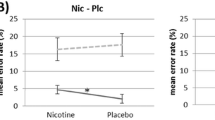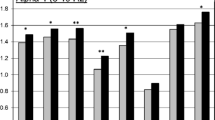Abstract
Three separate factors relevant to nicotine effects have been investigated in this experiment in combination: the experimentally induced expectation about receiving a sham or a nicotine cigarette, the mode of application of nicotine by a tablet, by a cigarette or not at all, while the belief of receiving the nicotine via smoking was held constant in each condition (by nicotine or sham smoking), and the personality factors of extraversion or neuroticism, respectively. Ninety-six healthy female student smokers were tested in a 2 × 3 × 2 factorial group comparison design with respect to critical flicker fusion and reaction time performance as well as to self-ratings on emotional and cortical arousal and ratings on desire for further cigarettes (satisfaction from smoking a single cigarette containing either 0.8 mg nicotine or a sham cigarette). In each case, a tablet containing either nicotine or placebo was administered together with the cigarette. The results showed that performance is sensitive to interaction effects of instruction and mode of application. The instruction of sham or nicotine assignment when applied with a congruent treatment (sham with a sham cigarette, or nicotine with a nicotine cigarette) both increased performance, while groups with discordant information showed worse performance. The administration of nicotine by tablets or by smoking differs considerably, nicotine cigarettes causing a stronger increase in emotional arousal, tablets rather a decrease or no effect, while the true placebo condition increases arousal due to deprivation effects. This leads to an enhancement of the nicotine effect with real smoking and to reactive increase of effort when sham smoking. The instruction affects alertness, the nicotine illusion leading to a lower reduction in subjective reports of alertness and concentration than that observed with the sham instruction. Neurotic subjects become more anxious and tense with nicotine cigarettes than stable subjects. This effect is less pronounced or even reversed with tablets. No interactions with instructions are observed with neuroticism. Extraverts tend to show a decrease in performance but an increase in alertness with the instruction of receiving nicotine as opposed to the sham expectation, whereas introverts behave the opposite way. Subjective ratings on arousal seem to follow the law of transmarginal inhibition, with extraverts being pushed from low arousal to high and introverts vice versa by the mere expectation.
Similar content being viewed by others
Author information
Authors and Affiliations
Additional information
Received: 11 February 1997/Final version: 30 June 1997
Rights and permissions
About this article
Cite this article
Netter, P., Hennig, J., Huwe, S. et al. Personality related effects of nicotine, mode of application, and expectancies on performance, emotional states, and desire for smoking. Psychopharmacology 135, 52–62 (1998). https://doi.org/10.1007/s002130050485
Issue Date:
DOI: https://doi.org/10.1007/s002130050485




